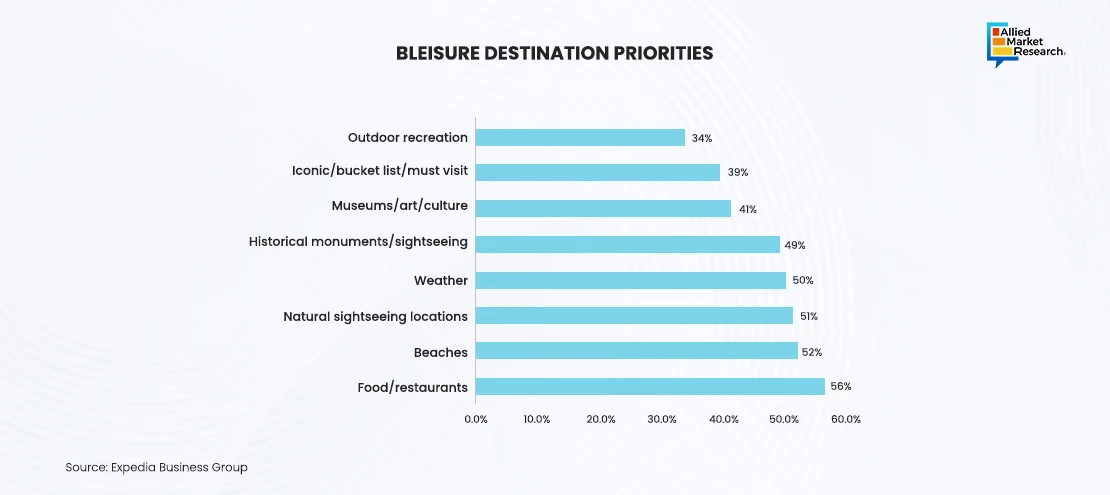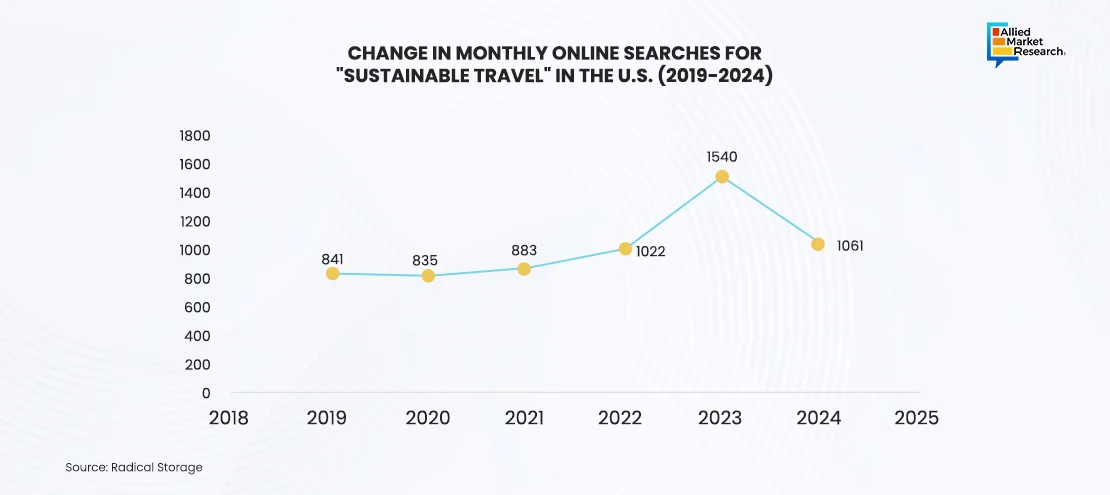Transformations in the Landscape of Leisure Travel: Strategies for Businesses to Flourish

Leisure travel, which includes travel for fun, leisure, and discovery, is an important part of global tourism. It covers a broad range of activities, including wellness retreats, adventure travel, city tours, beach holidays, and cultural experiences. Over time, the demand for leisure travel has grown significantly due to rising disposable incomes, greater access to travel information, and improvements in transportation. By the end of 2024, the leisure travel sector is expected to be shaped by evolving consumer preferences, advancements in technology, and shifts in the global economy.
Rise of experiential travel
In the leisure travel industry, there's a growing trend toward experiential travel, showcasing a shift in consumer preferences toward more meaningful and immersive experiences. Experiential travel emphasizes cultural immersion and personal enrichment, as opposed to standard vacations that are mostly centered on sightseeing. Travelers aim to establish genuine connections, participate in unusual activities, and interact deeply with local communities.
For instance, the "Experiences" platform on Airbnb, which offers a huge selection of locally hosted events, has completely changed the way tourists interact with places. Today, visitors can take part in community-based projects that support sustainable tourism, engage in guided hiking adventures with native guides, or take cooking lessons with local chefs.
This trend helps local economies and cultural heritage preservation in addition to making travel experiences more memorable by creating unforgettable experiences. The increasing focus on authenticity and personal growth among travelers suggests that this style of travel will likely get more prominence in the future.
Rising prevalence of new technologies
Technology has had a significant impact on the landscape of leisure travel industry, transforming the way people book, plan, and enjoy their trips. The application of machine learning and artificial intelligence to improve the personalization of travel experiences is one significant technological development. Travelers can now receive instant assistance, personalized recommendations, and simplified booking processes from AI-powered chatbots and virtual assistants, such as those developed by Expedia and Kayak. Furthermore, machine learning algorithms use enormous volumes of data analysis to forecast traveler preferences, enabling customized travel recommendations and optimal itineraries. For example, the use of AI by Airbnb to match guests with distinctive accommodations based on previous behavior and preferences has greatly improved customer satisfaction.
Another way that technology is changing leisure travel is through virtual reality and augmented reality. Using VR technology, prospective visitors take realistic previews of hotels and locations by taking virtual tours of them. In order to allow guests to preview locations and hotel amenities before making a reservation, companies such as Marriott have included virtual reality experiences in their lobby areas. Through the overlay of digital information on the physical world, augmented reality applications also improve the travel experience by facilitating easy navigation of unfamiliar locations for travelers. Travelers may explore new places more thoroughly with the help of AR-enabled applications, which can offer real-time instructions or historical information. These technological advancements make traveling easier and more enjoyable, as well as streamlining the travel process and personalizing the experience.

The growing concept of bleisure travel
In the leisure travel industry, the idea of "bleisure travel," or travel where work and pleasure meet, has become increasingly popular. This pattern shows how professionals are starting to view work-life balance differently, using business travel as an opportunity to travel and engage in leisure activities. Companies are recognizing that leisure travel can enhance productivity and improve employee satisfaction. A business executive attending a conference in Barcelona, for example, might decide to stay longer to take advantage of the city's rich cultural legacy, its strong food culture, or its gorgeous beaches. Similarly, computer workers in town for a business meeting in San Francisco might decide to extend their stay a few days to enjoy the natural beauty of Napa Valley or Yosemite National Park.
Both domestic and international business visits are included in leisure travel. Bleisure travel accounts for 51% of business travel inside the country and 52% of travel outside. When considering incorporating leisure time into work travel, business travelers also consider the location. The top attractions that encourage business travelers to extend their stay are listed in the table below.
The shift in destination preferences
Leisure travelers' preferences for destinations have changed significantly in the last few years, primarily due to the growing desire for genuine and distinctive experiences. Many tourists are moving away from the typical tourist destinations and toward more off-the-beaten-path places that provide a closer connection to the local cultures and scenic beauty. The trend is driven by the urge to avoid the heavy traffic often seen at popular sites and an increasing awareness of sustainability. For instance, the pristine landscapes and dedication to environmentally friendly tourism practices of places like Iceland and New Zealand have contributed to their recent rise in popularity. Similarly, lesser-known cultural heritage sites in nations such as Uzbekistan and Georgia are attracting tourists who want to experience rich histories and traditions away from the regular crowd.
Sustainability and Eco-Conscious Travel
The leisure travel industry is increasingly focusing on sustainability and eco-conscious practices as travelers are becoming more aware of the environmental impact of their journeys. In March 2019, the term "sustainable travel" had 841 monthly searches, which grew by 26% to 1,061 searches by March 2024. However, in April 2023, searches spiked to 1,856. Additionally, 29% of passengers reported that they would actively seek out sustainability information before making a reservation, while 25% had noticed sustainable hotel options when browsing online travel sites. In 2022, 71% of travelers said they would prioritize sustainable travel, but this figure has since decreased to 80%. News and social media are the primary sources of sustainability information for 43% of respondents who are aware of these practices.

Travelers who want to reduce their carbon impact and support conservation efforts are driving this trend. Choosing eco-friendly lodging and taking part in events that encourage environmental care are examples of sustainable travel practices. Many hotels and resorts now follow eco-friendly policies like reducing back on single-use plastics, using renewable energy and conserving water. One chain that places a strong emphasis on sustainability is Six Senses Hotels Resorts Spas, which integrates waste-to-wealth efforts, organic gardens, and community development projects into its operations.
In addition, more tourists are taking part in carbon offset schemes to make up for the emissions produced by their flights. Passengers flying with airlines like KLM and Delta have the option to invest in reforestation or renewable energy projects to make up for their carbon footprints. Additionally, by focusing on conservation and eco-friendly activities, travel destinations like Bhutan and Costa Rica have positioned themselves as leaders in sustainable tourism. Bhutan's "high-value, low-impact" tourist policy attempts to safeguard its natural and cultural heritage, while Costa Rica, renowned for its abundant biodiversity, has established substantial protected areas and eco-tourism projects. These examples show how sustainability is becoming more significant in the leisure travel industry, bringing about positive change and motivating tourists to make conscious decisions.

Bypassing the Barriers
However, the industry has encountered certain obstacles too, especially in recent years. But innovative thoughts and adaptable approaches have allowed it to prosper. Geopolitical instability has been one of the major obstacles, which can discourage tourists from visiting particular areas. For instance, instability in the Middle East has frequently resulted in erratic travel advisories, which affects travel. Travel agencies, thus, have shifted their emphasis to providing safer, nearby alternatives to get around this barrier and keep travelers engaged without sacrificing their safety.
Popular tourist destinations such as Venice and Barcelona face the challenges of over-tourism, as the high volume of visitors places significant pressure on local infrastructure and natural resources. In order to combat this, several towns have imposed visitor caps and encouraged travel during off-peak times, which helps to more evenly distribute tourist traffic throughout the year. Furthermore, the development of alternative destinations aids in reducing the strain on crowded areas. Travelers are encouraged to explore beyond the usual tourist spots by promoting lesser-known regions in Spain and Italy.
International travel operations face certain difficulties due to regulatory and legal challenges, such as differing data privacy regulations across countries. Companies are now required to revise their data handling procedures to comply with the European Union's General Data Protection Regulation (GDPR). In response, travel agencies have invested in strong data security measures and established clear privacy guidelines, which have both earned consumer trust and ensured regulatory compliance.
Here, it’s worth mentioning that the COVID-19 pandemic has notably transformed travel patterns due to heightened health and safety concerns. The industry’s swift adaptation to these challenges highlights its resilience. Enhanced sanitary measures, flexible booking options, and pandemic-inclusive travel insurance have helped restore traveler confidence. For example, hotels and airlines have implemented rigorous cleaning protocols and contactless services to prioritize health and safety while ensuring a seamless travel experience.
Summing up
Technological advancements, shifting customer preferences, and economic factors are all contributing to the rapid shifts in the leisure travel market. Modern travel advancements such as AI travel assistants and virtual reality previews have made travelers prefer unique, immersive experiences over standard tours. Also, there is a rising need for customized itineraries that cater to individual interests and environmentally friendly travel options. The practice of combining work and leisure, or "workations," has become popular due to remote work. Growing limitations, poor infrastructure, excessive tourism, unstable geopolitical conditions, and inadequate infrastructure are all barriers to market growth. Thus, if innovation, sustainability, and personalization are given constant attention, the industry's future seems promising despite these challenges.
Allied Market Research offers thorough market analysis and in-depth insights that assist key players in the leisure travel sector in capitalizing on new trends and successfully navigating obstacles. AMR provides organizations with the necessary data to develop new and customized travel experiences, through comprehensive reports on customer preferences, technological advancements, and sustainability initiatives. Furthermore, AMR's review of infrastructure, geopolitical, and regulatory factors helps businesses create strong plans to reduce risks and streamline processes. To stay ahead in the ever-changing leisure travel industry, it's important to explore new opportunities and ensure ongoing growth. Get in touch with our experts today to discover how we can help you achieve these goals.



